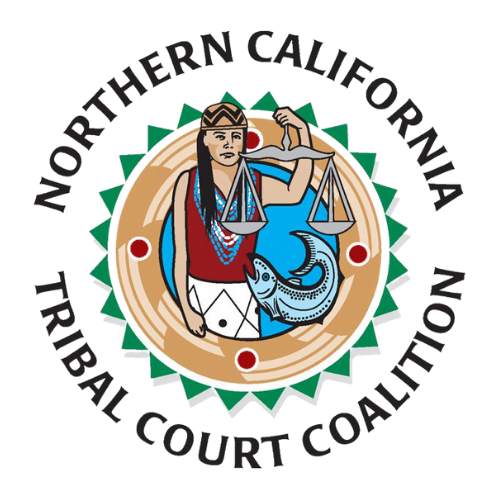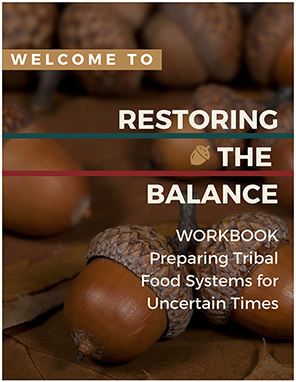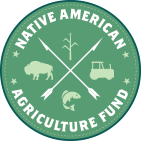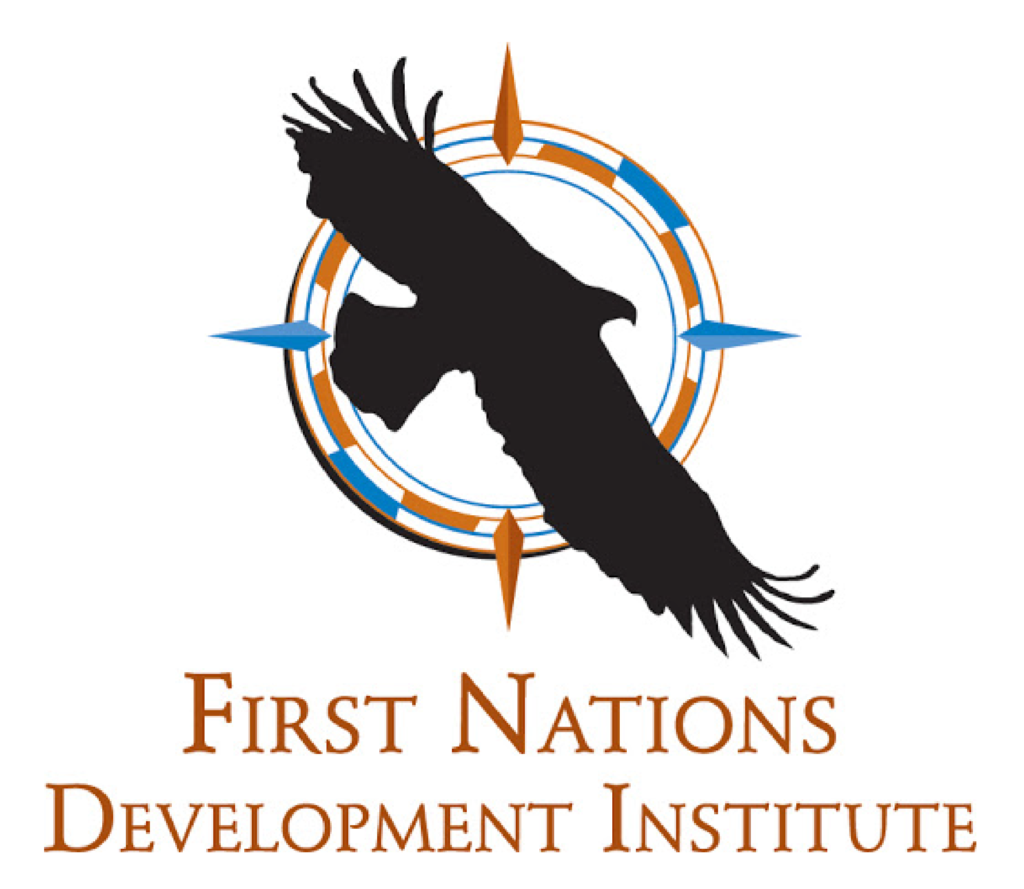Restoring the Balance: Preparing Tribal Food Systems for Uncertain Times
A Virtual Conference for Northern California Tribes
Registration: https://nctcc-rtb-2021.eventbrite.com
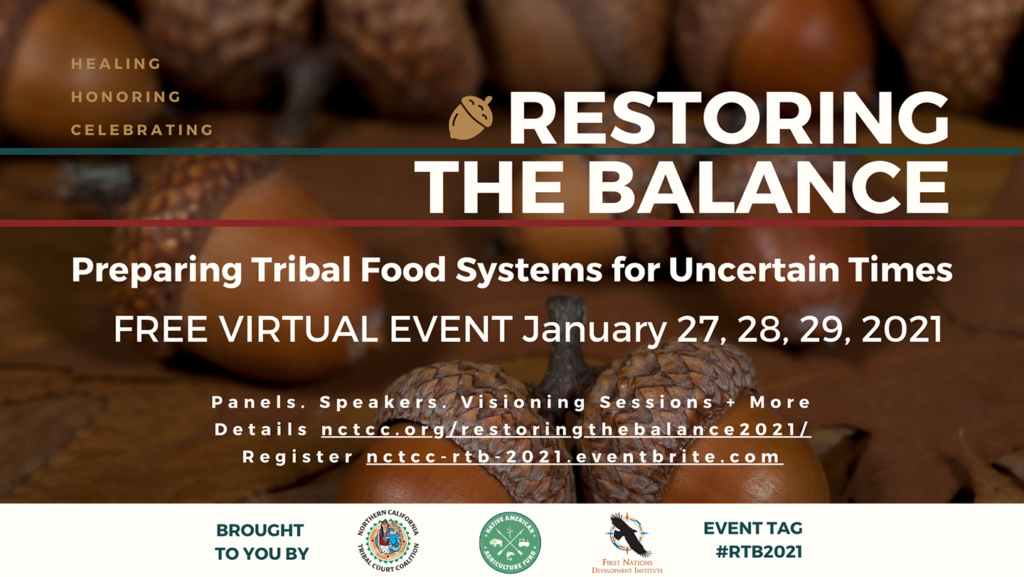
Hosted by Northern California Tribal Court Coalition
We hope you can join us for the 2021 Restoring the Balance virtual conference. Each day’s activities begin at 9:00 a.m. Pacific Time.

The theme of this year’s virtual community event is resilience and food security featuring local, regional, and national food sovereignty leaders. Together we will explore a holistic approach to building and supporting a resilient Tribal food system and the relationship of Tribal food sovereignty to law, policy, traditional resource management, economic development, education, and many other areas that influence the food systems of NCTCC’s member Tribes.
We will learn about local and regional projects, deliberate about strategies to strengthen Tribal food security, and explore funding opportunities as we contemplate Northern California Indigenous Peoples’ relationships with first foods, responsibilities for world renewal, and inherent sovereignty.
If you are a member or employee of the Yurok Tribe, Hoopa Valley Tribe, Karuk Tribe, Tolowa Dee-ni’ Nation, Trinidad Rancheria, and Bear River Band of the Rohnerville Rancheria, you are invited to a visioning session on the last day of the gathering. In this space, you can share your big ideas and inspirations, share how you are engaging with your Tribe’s food system, and learn from other’s experiences (event speakers and panelists are also welcome to participate in the session).

Wednesday, January 27: Planning Resilient Tribal Food Systems
Topics will focus on food policy, legislation, long-term planning, economic development, Tribal sovereignty and strengthening resilience.
8:45 am
Attendee Check In
9:00 am
Welcoming
Chairwoman Josefina Cortez of the Bear River Band of the Rohnerville Rancheria will open the event with words of welcome.
9:20 am
Keynote Address
Connecting Food and Tribal Sovereignty: Responsibility and Remembrance in Our World
Hon. Abby Abinanti, Yurok Tribal Court
10:30 am
Panel
Reflections on Developing Tribal Food and Agriculture Systems: Where to Start and How to Keep Going
Erin Parker and Carly D. Griffith Hotvedt, Indigenous Food and Agriculture Initiative
12:10 pm
Speaker
The Resiliency of the Hupa People through Food Sovereignty
Meagen Baldy, Pacific Region Intertribal Agriculture Council/Klamath Trinity Resource Conservation District/Cooking Healthy in Indian Country
1:10 pm
2:00 pm
Parting Words
Mr. Jeff Guido, Substance Use Disorder Counselor at Trinidad Rancheria will close the day with a prayer.

Thursday, January 28: Supporting A Resilience Movement
Topics will focus on Tribal food producers: food preparation, resource stewardship, integrating food sources with well being, startup opportunities.
8:45 am
Attendee Check In
9:00 am
Welcoming
Yurok Tribe Vice Chairman Frankie Myers will provide the opening words.
9:20 am
10:00 am
Panel
Intertribal Agriculture Council – Food Sovereignty Startup Examples
Keir Johnson-Reyes, Intertribal Agriculture Council (Facilitator)
Jude Marshall, United Indian Health Services, Inc. Food is Good Medicine
Taylor Thompson (They/Them), Yurok Tribe Environmental Program. Starts for Sovereignty: Yurok Food Villages
11:40 am
12:25 pm
Parting Words

Friday, January 29: Showcasing Tribal Food System Resilience
Speakers share their Tribes’ journeys to more resilient food systems and the ability to withstand uncertainty.
8:45 am
Attendee Check In
9:00 am
Welcoming
Suntayea Steinruck and Marva Sii~xuutesna Jones of the Tolowa Dee-ni’ Nation will share a song to open the day.
9:20 am
Speaker
Keeping the Promise: CTUIR First Foods and Food Systems Working Group
Wenix Red Elk, Confederated Tribes of the Umatilla Indian Reservation
10:30 am
Speaker
Promising the Future: CTUIR Climate Adaptation Rooted in First Foods Resilience
Colleen Sanders, Confederated Tribes of the Umatilla Indian Reservation
11:40 am
Panel
Strategies, Resources, and Funding Opportunities to Implement Tribal Food Sovereignty Programs
Carly D. Griffith Hotvedt, Indigenous Food and Agriculture Initiative
Keir Johnson-Reyes, Intertribal Agriculture Council
12:40 pm
Parting Words
Karuk Tribe Chairman Russell “Buster” Attebery will close the event with a few words.
1:00-1:45 pm
Lunch Break
1:45 pm
Tribal Visioning Session
An opportunity for leaders, staff, and members of NCTCC’s member Tribes to converse with speakers and one another about the future of their Tribes’ food sovereignty.
- Yurok Tribe
- Hoopa Valley Tribe
- Karuk Tribe
- Tolowa Dee-ni’ Nation
- Trinidad Rancheria
- Bear River Band of the Rohnerville Rancheria
To register for the conference and receive email updates please visit the NCTCC Eventbrite registration page: https://nctcc-rtb-2021.eventbrite.com
To receive social media updates on the conference, follow us on Facebook or Instagram, or bookmark this page.
Speakers
Hon. Abby Abinanti (Yurok Tribe)
Chief Judge, Yurok Tribal Court
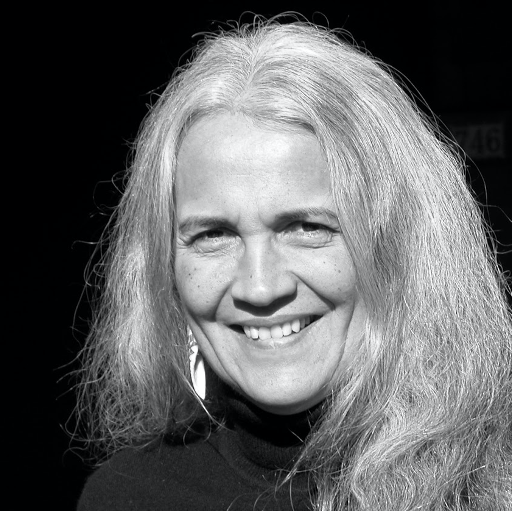
Hon. Abby Abinanti is the Chief Judge of the Yurok Tribal Court and enrolled Yurok Tribal member. She holds a Doctor of Jurisprudence from the University of New Mexico School of Law, and was the first California tribal woman to be admitted to the State Bar of California. She was a State Judicial Officer (Commissioner) for the San Francisco Superior Court for over 17 years assigned to the Unified Family Court (Family/Dependency/ Delinquency). She retired from the Superior Court in September 2011 and on July 31, 2014 was reappointed as a part-time Commissioner for San Francisco assigned to Dependency, and Duty Judge for that Court where she served until 2015. She has been a Yurok Tribal Court Judge since 1997 and was appointed Chief Tribal Court Judge in 2007, a position she held in conjunction with her Superior Court assignment until 2015.
View Judge Abby’s keynote address on YouTube
Materials for Judge Abby’s talk can be found here: https://nctcc.org/practice/rights-of-mother-earth/
Carly D. Griffith Hotvedt, JD, MPA (Cherokee Nation)
Director of Tribal Enterprise, Indigenous Food and Agriculture Initiative
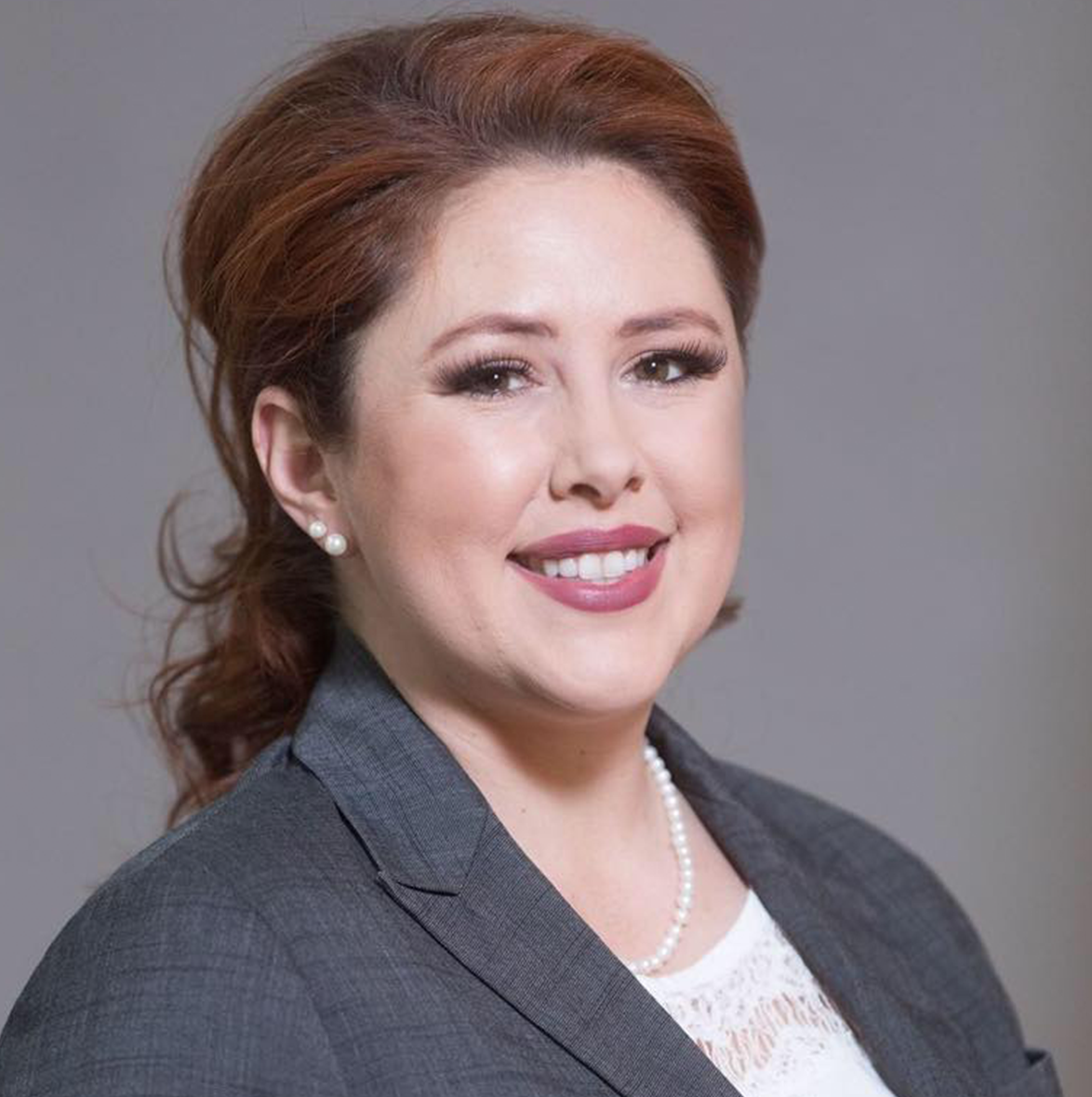
Carly Griffith Hotvedt, a citizen of Cherokee Nation, is a seasoned legal professional, admitted to practice in Oklahoma, Cherokee Nation and Muscogee (Creek) Nation, with an affinity for government law, agriculture, tribal policy and public administration. In her current role as Director of Tribal Enterprise with the Indigenous Food and Agriculture Initiative, she works with tribes and in tribal policy to advance food security and tribal agriculture enterprise development. Prior to joining IFAI, she created and directed the Division of Agriculture and Natural Resources at Muscogee (Creek) Nation, where she initiated an overhaul of the Agribusiness operation resulting in a 70%+ loss margin reduction and set the program on track for profitability.
Carly clerked for the late Oklahoma Supreme Court Justice Marion Opala while in law school, in addition to municipal internships with the City of Lawton and the City of Norman. She has a 100% success rate in the Courts of the Cherokee Nation.
View the IFAI panel presentation on YouTube (Currently in post-production)
View the IFAI presentation slides
View the funding strategies panel discussion on YouTube (Currently in post-production)
Visit the IFAI website here: https://indigenousfoodandag.com
Colleen Sanders
Climate Adaptation Planner, Confederated Tribes of the Umatilla Indian Reservation
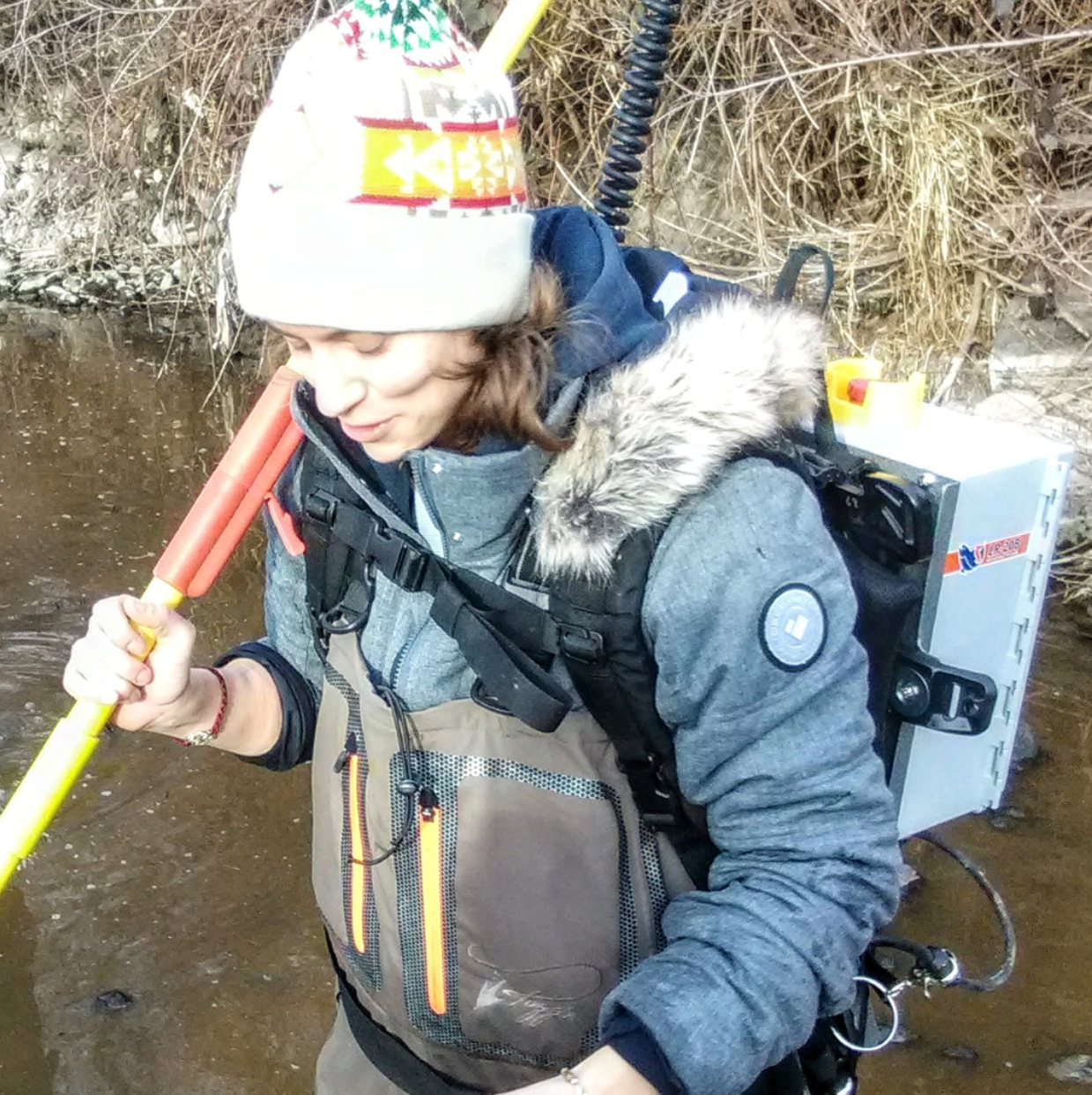
Colleen Sanders has been working with CTUIR First Foods Policy Program for over three years, and has been engaged with local food systems and small scale agriculture for over a decade. She channeled her passion for wild systems into a Bachelors of Science degree in Wildlife Ecology from the University of British Columbia, and while working in the food industry after graduating, decided to translate her belief in food as the answer to a Masters of Science degree in Community Food Systems, and a graduate certificate in Sustainable Agriculture from Washington State University. While not a tribal member herself, Colleen has lived and worked in Umatilla County since 2013, and has the honor of examining the impacts that climate change will have on CTUIR’s build, social, and natural resources, and has worked with climate change issues in rural Oregon with the grassroots Eastern Oregon Climate Change Coalition (EOC3) since 2015, of which she was the founding chair of the board of directors. She spends her non-existent free time building a closer connection with her food, land, and community in Pendleton, Oregon, as well as way of improving food access and resilience for the people who live there.
View Colleen’s presentation on YouTube (Currently in post-production)
Learn more about Colleen’s work here: https://ctuir.org/departments/natural-resources/climate-adaptation/
Corine Pearce (Little River Band of Pomo Indians) (She/Her)

Corine Pearce (she/her) is a basket weaver, herbalist, dancer, storyteller and cultural educator with ancestry from Lake and Mendocino county. She is an enrolled member from the Little River Band of Pomo Indians located in Redwood Valley, California.
Corine has taught classes focused on traditional uses of native plants, land stewardships and fire ecology, as well as basket weaving and traditional ecological knowledge (TEK) for over 25 years. Corine teaches in her community through several entities including museums, tribal education centers and local school districts.
Corine was recently a guest presenter at the 40th annual EcoFarm conference. She is the author of Pomo Cradle Baskets: An Introduction, and has been featured in the PBS program, Craft in America ‘California’ episode. Corine was nominated for the United States Artist Fellowship in 2019 and is a 2020 Jennifer Easton Community Spirit award recipient as well as 2020 inaugural Luce Indigenous Knowledge Fellow.
View Corine’s presentation on YouTube (Currently in post-production)
Learn about Corine’s work here: https://corinepearce.com
Purchase a copy of Corine’s book here: https://beautyandlove.org/2018/04/08/beauty-love-publishing-debut/
Erin Parker, JD, LLM
Director, Indigenous Food and Agriculture Initiative

Erin Parker currently serves as the Director of the Indigenous Food & Agriculture Initiative at the University of Arkansas School of Law, where she leads the Initiative through program development, research and writing, and analysis of legislative and regulatory issues affecting Tribal governments, businesses, and individual producers.
Before beginning her work with the Initiative, she worked as a Staff Attorney and Research Coordinator for the Cobell Commission, a national working group convened by the Secretary of the Interior to repair the federal government’s Indian land trust management system.
Erin holds both her J.D. and her LL.M. in Agricultural & Food Law from the University of Arkansas.
View the IFAI panel presentation on YouTube (Currently in post-production)
View the IFAI presentation slides
Visit the IFAI website here: https://indigenousfoodandag.com
Jude Marshall (Hupa, Karuk, and Yurok)
Community Nutrition Program Manager, United Indian Health Services, Inc.
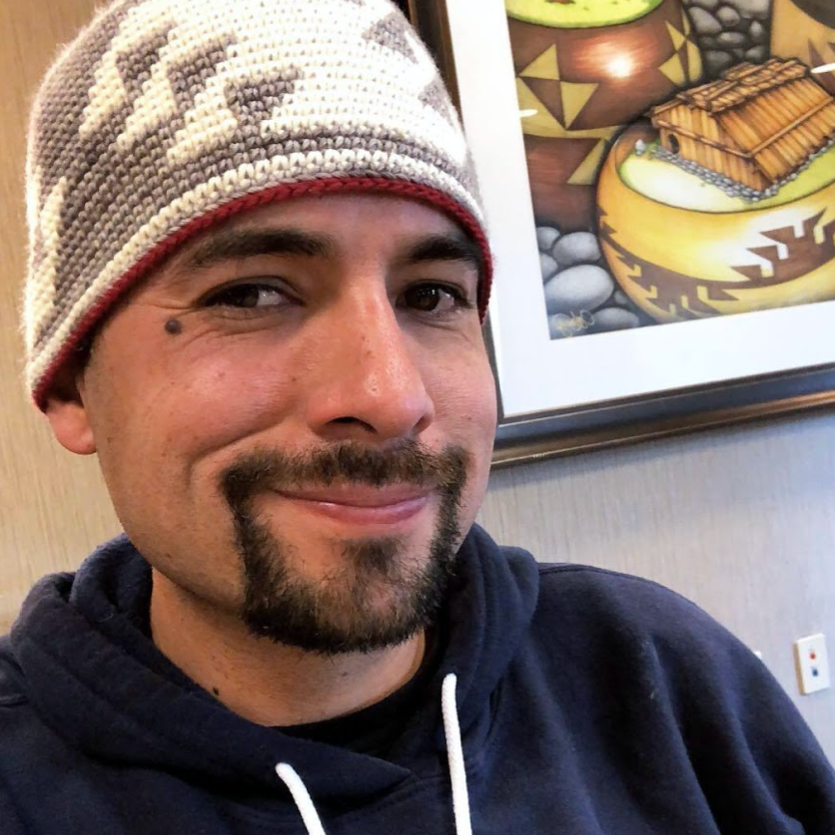
Jude Marshall is a local, tribal cultural practitioner and traditional foods enthusiast. Jude earned a Bachelor of Arts degree in Recreation Administration with a minor in Native American Studies from Humboldt State University and is currently the Community Nutrition Program Manager at the Potawot Health Village in Arcata, CA. He oversees the thriving Potawot Community Food Garden that supplies healthy nutrition to many Native families along the coast.
Jude brings with him a great deal of knowledge and experience on providing healthy activities to Native families in Humboldt and Del Norte regions. Jude’s passion for good food and nutrition is something that he’s experienced firsthand: how eating in a way that resembles the local native traditional diet can transform lives and communities. “To have strong Tribal Nations we must have strong and healthy individuals … We must eat and move like our ancestors.” Jude believes to be physically healthy starts with nutrition.
When it comes to eating healthy and building healthy communities, Jude believes Tribal Nations need to have control of their food systems. “Tribal Nations must have Food Sovereignty. To be able to control and manage all of the factors that contribute towards a self-sufficient food system. We must feed ourselves from our resources from within. We need to constantly work on weaving the food web, one strand at a time.”
View the Intertribal Agriculture Council panel discussion on YouTube (Currently in post-production)
Learn more about the Community and Wellness Program at United Indian Health Services: http://unitedindianhealthservices.org
Visit the Potawot Community Food Garden Facebook page: https://www.facebook.com/PotawotCommunityFoodGarden/
Keir Johnson-Reyes (Osage Nation)
Pacific Regional Technical Assistance Specialist/ National TA Lead, Intertribal Agriculture Council
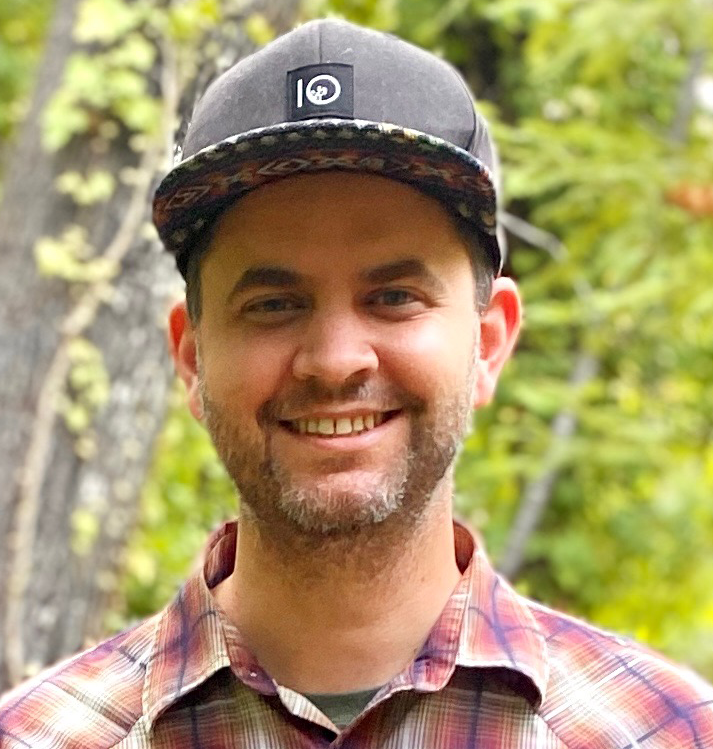
Keir Johnson-Reyes is a member of the Osage Nation of Oklahoma and works for Intertribal Agriculture Council (IAC), the nation’s largest and longest standing Native American agriculture organization. As a Technical Assistance Specialist with IAC, Keir serves 138 California and Nevada Tribal communities and individual agricultural producers by assisting with eligibility, access, and interface involving federal, state, local, and organizational resources. Keir’s areas of focus include agriculture, natural resources/land management, community development, government to government intermediacy, and Native youth leadership development. He has a background in education, outreach, traditional seed preservation, organic vegetable production, community engagement, project development and administration, and permaculture design.
During his tenure with IAC, Keir has co-developed the USDA Natural Resources Conservation Service (NRCS) California Tribal Conservation Advisory Council and is currently working with Tribal and agency representatives in Nevada to develop a state level Tribal advisory council there. He served as a coordinating lead author on the California Tribal Climate Assessment as part of the state’s 4th Climate Assessment. In 2015, Keir co-founded the Braiding the Sacred network of indigenous traditional corn growers which focuses on supporting the perpetuation of traditional heirloom corn varieties from Canada to South America, with a focus on communities in the United States. He has individually visited and coordinated with nearly one hundred Tribes in the region he serves and beyond. Keir continues to be invited to speak as a guest lecturer at universities and community events on topics concerning Tribal food sovereignty, community food systems project development, and Native youth leadership and engagement.
View the Intertribal Agriculture Council panel discussion on YouTube (Currently in post-production)
View the funding strategies panel discussion on YouTube (Currently in post-production)
Learn more about IAC programs here: https://www.indianag.org
Meagen Baldy (Hupa/Yurok)
Executive Board Member, Pacific Region Intertribal Agricultural Council
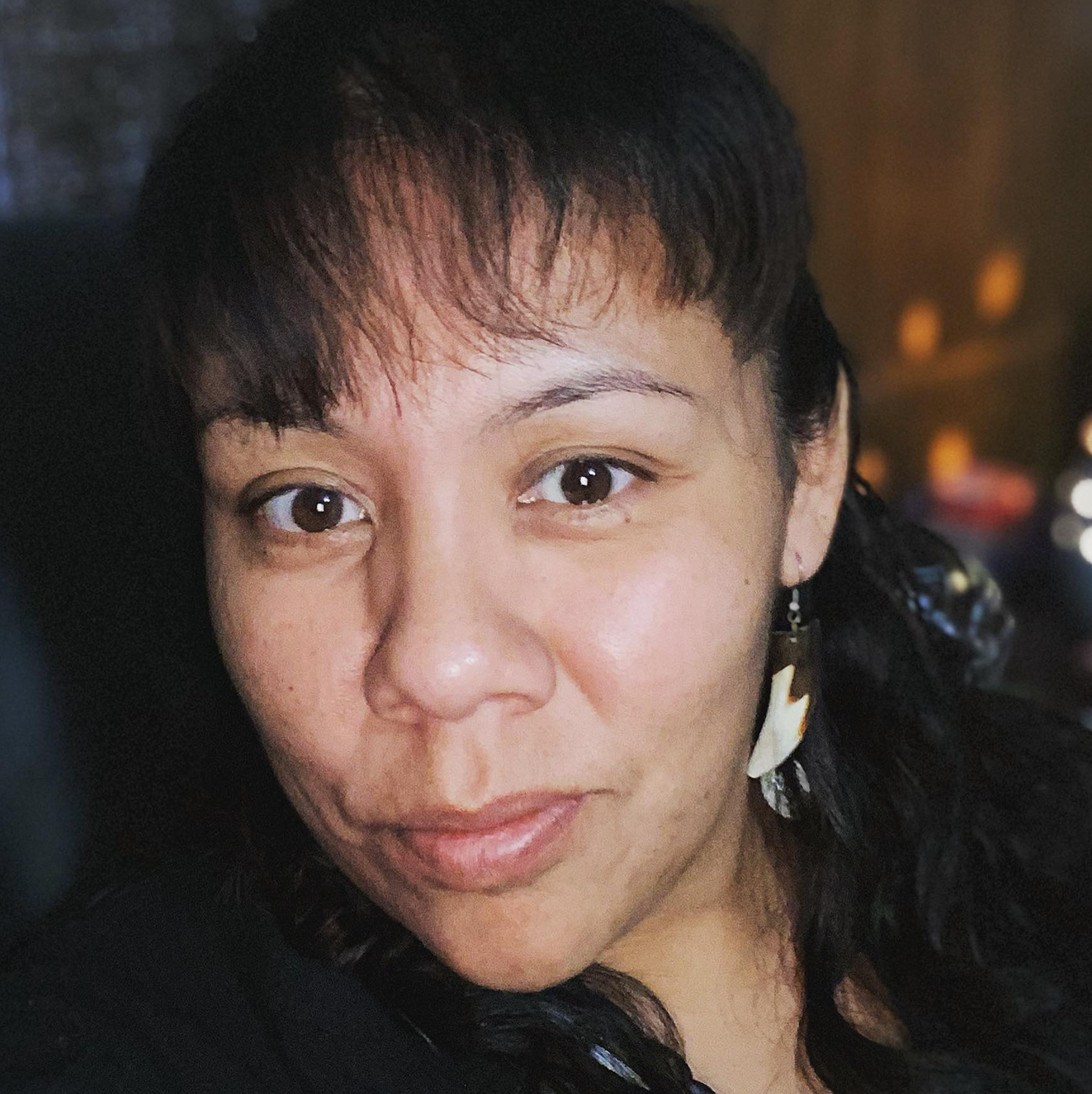
Meagen Baldy is the District Coordinator for the Klamath Trinity Resource Conservation District, Director of Cooking Healthy in Indian Country, and Executive Board Member for the Pacific Region Intertribal Agricultural Council.
Learn about the work of the Pacific Region Intertribal Agriculture Council: https://www.indianag.org/pacific
Learn about the latest projects of the Klamath Trinity Resource Conservation District on Facebook
Visit Cooking Healthy in Indian Country
Contribute to the Food Pantries in Hoopa GoFundMe Project: https://gofund.me/b86ae66a
Sara Calvosa Olson (Karuk)

Sara Calvosa Olson is a Karuk home cook working with Indigenous Californian foods and is the author of a forthcoming cookbook on that same topic. With an interest in using both culturally sound & faithfully updated techniques in preparing traditionally Indigenous plants and animals, her cooking inspires a new look at the oldest foods in California.
View the Sara’s cooking presentation on YouTube (Currently in post-production)
Learn more about Sara’s work here: https://akihsara.com/sara
Marva Sii~xuutesna-Jones (Tolowa Dee-ni’/Yurok/Karuk/Wintu)
Cultural Activist
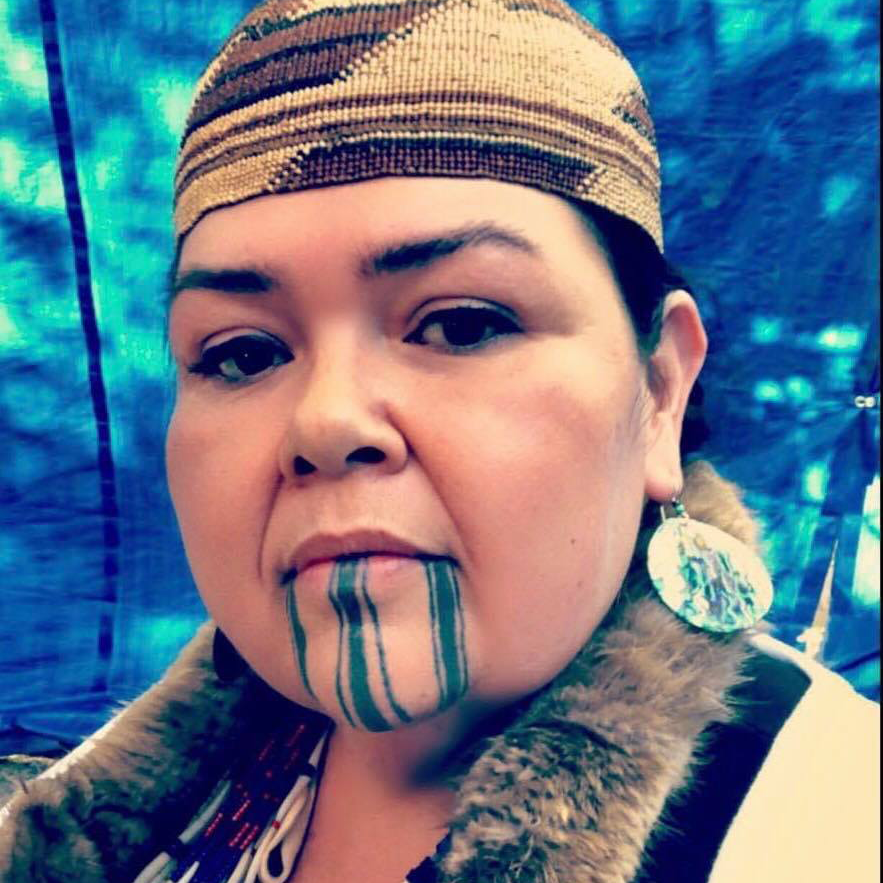
Marva Sii~xuutesna Jones, Tolowa Dee-ni’|Yurok|Karuk|Wintu, raised at her maternal village of Nii~lii~chvndvn who works mainly in her Northern California communities to sustain and enhance Indigenous worldview approaches through food, values, practice, presence, healing and resiliency. Sii~xuutesna has significant experience and skills in community-building with ancestral ingrain. Service and advocacy offered in grassroots, community-driven and tribally-focused initiatives. She is committed to ensuring her children sustain strong bonds and responsibility to their lineage while practicing and protecting those things that keep us whole. Invested in our peoples’ legacy of healing through resilience offered in a healthy presence.
View Sii~xuuntesna’s presentation on YouTube (Currently in post-production)
Read more about Marva’s work and advocacy:
Laws and climate change are harming this tribe’s foodways. Here’s how they survive.
‘Our Earth Is In Pain’: Local Rally Urges Action On Climate Change
Taylor Thompson (Cherokee Nation) (They/Them/Theirs)
Food Sovereignty Division Manager, Yurok Tribe Environmental Program
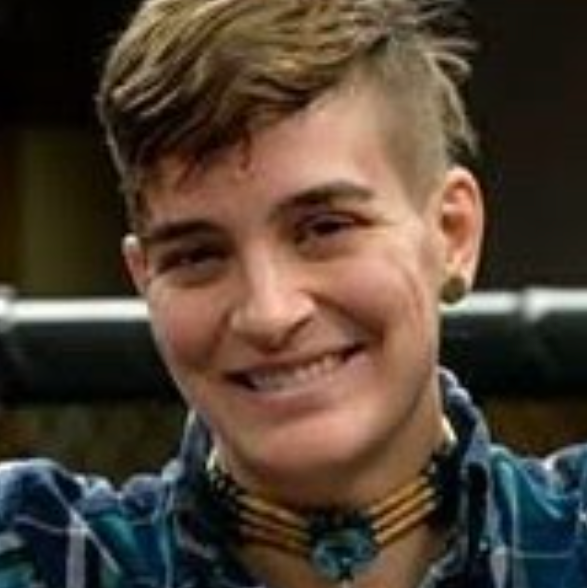
Osiyo! I am a two-spirited citizen of the Cherokee Nation and my pronouns are They/Them/Theirs. I am honored to be the Food Sovereignty Division Manager for the Yurok Tribe Environmental Program since its creation in August 2020, where I am working to provide fresh produce and restore access to traditional foods to Yurok Tribal members, who have maintained existence in their ancestral territory since time immemorial. I also serve on the steering committee for the Humboldt State University Native American Studies Food Sovereignty Lab and Cultural Workspace. I graduated from the University of Utah in 2014 with a B.S. in Environmental and Sustainability Studies and a B.S. in Environmental and Organismal Biology. I have called many places “home” throughout my life, including Hawaii, Utah, Ireland, Massachusetts, New Mexico, and now on Wiyot land in California.
View the Intertribal Agriculture Council panel discussion on YouTube (Currently in post-production)
Read about the Yurok Tribe’s food sovereignty program here: https://www.northcoastjournal.com/NewsBlog/archives/2020/12/30/yurok-tribe-purchases-40-acre-land-for-food-security-farm
Wenix Red Elk (Confederated Tribes of the Umatilla Indian Reservation)
Public Outreach and Education Specialist, Confederated Tribes of the Umatilla Indian Reservation

Wenix is the Public Outreach and Education Specialist for the Confederated Tribes of the Umatilla Indian Reservation’s Department of Natural Resources (DNR). Wenix coordinates and implements First Food related educational presentations, activities and events for DNR’s Water Resources, Fisheries, Wildlife, Ag, Range and Forestry, First Foods Policy and the Cultural Resources Protection Programs.
Wenix has over 16 years’ experience in Natural Resources. As a young adult, Wenix worked for the Earth Conservation Corps, Salmon Corps branch restoring and revitalizing plant and salmon habitats, watersheds and native vegetation to its natural habitat to stabilize fish populations and reintroduction of wild salmon stock back into watershed areas. Wenix has learned about her culture and tribal traditions from the time of birth. She has successfully taught over 225 cultural classes consisting of beading, tule mat making, traditional food gathering and preparation, quill working, sewing, and other forms of traditional arts.
In the last 6 years Wenix has provided over 500 First Foods related presentations on behalf of the Umatilla Confederated Tribes DNR First Foods Management and educated over 40,000 people on her Tribe’s Restoration effort throughout their Ceded territories and beyond.
View Wenix’s presentation on YouTube (Currently in post-production)
Learn more about the First Food Excursions that Wenix leads: https://issuu.com/confederatedumatillajournal/docs/cuj_june_2018
Our Partners
Thank you to our partners whose generous support makes Restoring the Balance possible. Northern California Tribal Court Coalition is a grantee
NCTCC is a 2020-2021 grantee of Native American Agriculture Fund. The grant provided to NCTCC will fund the conference and a COVID-19 Tribal Food Systems Assessment.
Conference funding from First Nations Development Institute is provided through the recently-established California Tribal Fund.
Participating Organizations and Tribal Nations
Special thanks to the organizations and Tribal Nations whose active participation makes the 2021 Restoring the Balance conference possible.
- Bear River Band of the Rohnerville Rancheria
- Hoopa Valley Tribe
- Karuk Tribe
- Tolowa Dee-ni’ Nation
- Trinidad Rancheria
- Yurok Tribe
- Confederated Tribes of the Umatilla Indian Reservation
- Dahotra Consulting and Design
- Indigenous Food and Agriculture Initiative, University of Arkansas
- Intertribal Agriculture Council
- California Indian Museum and Cultural Center
- United Indian Health Services
